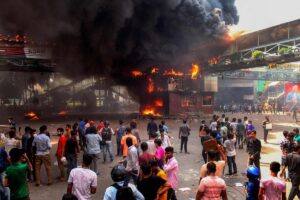ButSpeak.com
News which Matters.

Bangladesh imposes a curfew as student-led protests against government job quotas result in over 100 deaths. The nationwide unrest sees internet shutdowns and violent clashes.
Bangladesh soldiers patrolled the deserted streets of Dhaka amid a curfew imposed to quell deadly student-led protests against government job quotas. The week-long unrest has resulted in over 100 deaths, with the internet and text message services suspended since July 18, effectively cutting off Bangladesh from the world. Despite a ban on public gatherings, the protests have continued unabated.
The violent clashes have left at least 105 people dead and thousands injured, according to data from hospitals across the country. The Dhaka Medical College Hospital alone received 27 bodies on Friday between 5 p.m. and 7 p.m. The nationwide protests initially erupted due to student anger over new quotas for government jobs, which include a 30% allocation for families of those who fought for independence from Pakistan. This measure has reignited sensitive political divisions between those who fought for Bangladesh’s independence in 1971 and those accused of collaborating with Islamabad.
Over the past five days, police have deployed tear gas and sound grenades to disperse protesters. Demonstrators have clashed with security personnel, throwing bricks and setting vehicles on fire. The unrest has led to significant destruction, including the torching of government buildings and a nationwide internet blackout.
With the death toll rising and the police struggling to control the violent protests, Prime Minister Sheikh Hasina’s government imposed a national curfew on Friday and deployed the military. The curfew, initially set to last until 10 a.m. on July 21, was briefly eased for two hours from 12 p.m. on July 20 to allow people to shop for supplies and complete essential chores. The government will reassess the situation to determine the next steps.
The protests are the largest since Hasina was re-elected for a fourth consecutive term this year. They have been further fueled by high unemployment rates among young people, who constitute nearly a fifth of Bangladesh’s 170 million population. International rights groups have criticized the internet suspension and the actions of the security forces, with the European Union expressing deep concern over the violence and loss of life.
As the situation in Bangladesh remains tense, the government faces mounting pressure to address the grievances of the protesters while maintaining order. The death of a reporter during the unrest has prompted media bodies to call for an investigation, adding another layer of complexity to the crisis.